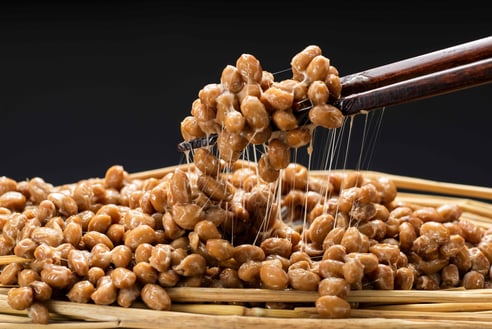-
Ingredient SolutionsQuickly narrow your search. Browse products in our sortable catalog. View Catalog
-
ApplicationsQuickly narrow your search. Browse products in our sortable catalog. View Catalog
-
ResourcesRecently Posted
-
PLT People & Planet
-
About
Our international network, passionate team of experts and extensive industry knowledge is what sets us apart.
 Seth FlowermanCEO
Seth FlowermanCEO
Vitamin K-containing dietary supplements: comparison of synthetic vitamin K1 and natto-derived menaquinone-7

.png?width=298&height=145&name=menatto%20logo%20(r).png)

Citation: Schurgers LJ, Teunissen KJ, Hamulyák K, Knapen MH, Vik H, Vermeer C. Vitamin K-containing dietary supplements: comparison of synthetic vitamin K1 and natto-derived menaquinone-7. Blood. 2007;109(8):3279-3283. doi:10.1182/blood-2006-08-040709
Abstract: Vitamin K is a cofactor in the production of blood coagulation factors (in the liver), osteocalcin (in bone), and matrix Gla protein (cartilage and vessel wall). Accumulating evidence suggests that for optimal bone and vascular health, relatively high intakes of vitamin K are required. The synthetic short-chain vitamin K(1) is commonly used in food supplements, but recently the natural long-chain menaquinone-7 (MK-7) has also become available as an over-the-counter (OTC) supplement. The purpose of this paper was to compare in healthy volunteers the absorption and efficacy of K(1) and MK-7. Serum vitamin K species were used as a marker for absorption and osteocalcin carboxylation as a marker for activity. Both K(1) and MK-7 were absorbed well, with peak serum concentrations at 4 hours after intake. A major difference between the 2 vitamin K species is the very long half-life time of MK-7, resulting in much more stable serum levels, and accumulation of MK-7 to higher levels (7- to 8-fold) during prolonged intake. MK-7 induced more complete carboxylation of osteocalcin, and hematologists should be aware that preparations supplying 50 mug/d or more of MK-7 may interfere with oral anticoagulant treatment in a clinically relevant way.













